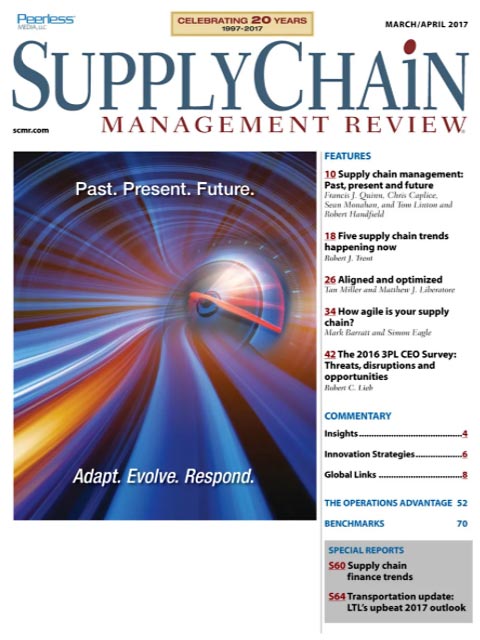Sorry, but your login has failed. Please recheck your login information and resubmit. If your subscription has expired, renew here.
March-April 2017
Supply Chain Management Review, which is celebrating its 20th anniversary with this issue.Twenty years after the premier issue, our goal remains the same: To present thought leadership around best practices in supply chain fundamentals, publish case study examples of what leading companies are doing in their supply chains and keep our finger on the pulse of emerging trends and technologies that will shape the future. While Frank’s essay looks to the past and brings us to the present, we also have essays from four experienced supply chain professionals looking to the future of supply chain management. Browse this issue archive.Need Help? Contact customer service 847-559-7581 More options
In today’s competitive global economy, a firm’s market position and financial performance is closely linked to its supply chain performance. All too often, considerable managerial resources are directed toward planning activities and processes that deliver little in the way of tangible results and beneficial outcomes. What supply chain executives want is the know-how to efficiently and effectively direct their planning activities so that the results lead to better business decisions from the long-term down to day-to-day operations. What they often end up with is a set of unaligned decision-making processes that result in uncoordinated, inefficient planning and operations.
There is a better way: using Supply Chain Frameworks to oversee and guide planning and operations. Supply Chain Frameworks organize and manage all supply chain activities and decisions as a set of “linked” steps and processes that are part of one unified system, enabling managers to achieve high levels of operating effectiveness and efficiency.
In this article, we present proven, practical management frameworks and techniques that we used to support supply chain operations management and planning in the private sector. These frameworks provide methodologies for organizing and managing critical activities such as supply chain strategic planning and project selection, integrated manufacturing and distribution planning, performance measurement and warehouse planning and operations, to name a few.
We also illustrate how managers can and should employ planning frameworks to organize and manage all major supply chain functions and activities. While a firm clearly must have a framework to guide its overall supply chain strategic planning process, so too should the firm have a well-established planning framework for its individual supply chain functions such as transportation, manufacturing and logistics. Further, and most critically, all these supply chain planning frameworks must support and align with the firm’s overall business goals and objectives.

This complete article is available to subscribers only.
Log in now for full access or start your PLUS+ subscription for instant access.
SC
MR
Sorry, but your login has failed. Please recheck your login information and resubmit. If your subscription has expired, renew here.
March-April 2017
Supply Chain Management Review, which is celebrating its 20th anniversary with this issue.Twenty years after the premier issue, our goal remains the same: To present thought leadership around best practices in supply… Browse this issue archive. Access your online digital edition. Download a PDF file of the March-April 2017 issue.
In today's competitive global economy, a firm's market position and financial performance is closely linked to its supply chain performance. All too often, considerable managerial resources are directed toward planning activities and processes that deliver little in the way of tangible results and beneficial outcomes. What supply chain executives want is the know-how to efficiently and effectively direct their planning activities so that the results lead to better business decisions from the long-term down to day-to-day operations. What they often end up with is a set of unaligned decision-making processes that result in uncoordinated, inefficient planning and operations.
There is a better way: using Supply Chain Frameworks to oversee and guide planning and operations. Supply Chain Frameworks organize and manage all supply chain activities and decisions as a set of “linked” steps and processes that are part of one unified system, enabling managers to achieve high levels of operating effectiveness and efficiency.
In this article, we present proven, practical management frameworks and techniques that we used to support supply chain operations management and planning in the private sector. These frameworks provide methodologies for organizing and managing critical activities such as supply chain strategic planning and project selection, integrated manufacturing and distribution planning, performance measurement and warehouse planning and operations, to name a few.
We also illustrate how managers can and should employ planning frameworks to organize and manage all major supply chain functions and activities. While a firm clearly must have a framework to guide its overall supply chain strategic planning process, so too should the firm have a well-established planning framework for its individual supply chain functions such as transportation, manufacturing and logistics. Further, and most critically, all these supply chain planning frameworks must support and align with the firm's overall business goals and objectives.
 SUBSCRIBERS: Click here to download PDF of the full article.
SUBSCRIBERS: Click here to download PDF of the full article.
SC
MR


Latest Supply Chain News
- Few executives believe their supply chains can respond quickly to disruptions
- Technology’s role in mending supply chain fragility after recent disruptions
- Tech investments bring revenue increases, survey finds
- Survey reveals strategies for addressing supply chain, logistics labor shortages
- Israel, Ukraine aid package to increase pressure on aerospace and defense supply chains
- More News
Latest Podcast

 Explore
Explore
Latest Supply Chain News
- Few executives believe their supply chains can respond quickly to disruptions
- Technology’s role in mending supply chain fragility after recent disruptions
- Tech investments bring revenue increases, survey finds
- Survey reveals strategies for addressing supply chain, logistics labor shortages
- Israel, Ukraine aid package to increase pressure on aerospace and defense supply chains
- How CPG brands can deliver on supplier diversity promises
- More latest news
Latest Resources

Subscribe

Supply Chain Management Review delivers the best industry content.

Editors’ Picks





